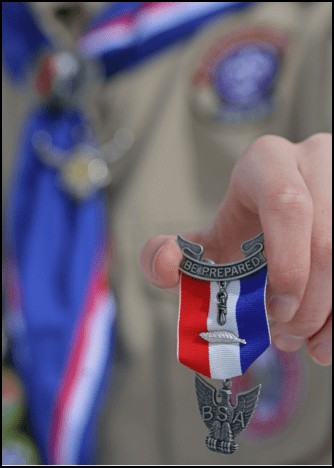The Eagle Scout Award is the highest achievement attainable in the Scouts BSA program, a prestigious recognition symbolizing dedication, leadership, and service. This comprehensive guide explores the Eagle Scout requirements, the steps involved in achieving this esteemed rank, and the significant benefits it offers. Whether you’re a Scout striving for Eagle or a parent supporting their journey, this guide provides valuable insights into the Eagle Scout process.
The Significance of the Eagle Scout Award
Earning the Eagle Scout Award signifies more than just completing a program; it represents a Scout’s unwavering commitment to the Scout Oath and Law, their development of crucial leadership skills, and their dedication to making a positive impact on their community. It is a testament to their character, discipline, and willingness to serve others. This award is highly respected and recognized, opening doors to opportunities in education, career, and community involvement.
 Eagle Scout requirements overview
Eagle Scout requirements overview
Understanding the Eagle Scout Requirements
To be eligible for the Eagle Scout Award, a Scout must meet specific requirements, demonstrating their proficiency in various skills and their commitment to Scouting ideals. These Eagle Scout requirements include:
- Active Participation: Be active in your troop, team, crew, or ship for a period of at least six months as a Life Scout.
- Rank Advancement: Progress through the ranks of Tenderfoot, Second Class, First Class, Star, and Life.
- Merit Badges: Earn a total of at least 21 merit badges, including 13 required merit badges that cover essential skills and knowledge.
- Leadership Role: Serve actively in a leadership position within your unit for a minimum of six months as a Life Scout.
- Service Project: Plan, develop, and lead a significant community service project that benefits an educational, religious, or community organization.
- Scout Spirit: Demonstrate Scout Spirit by living the Scout Oath and Scout Law in your daily life.
- Age Requirement: Be under the age of 18.
Required Merit Badges: A Foundation of Skills
The 13 required merit badges for the Eagle Scout Award are:
- First Aid
- Citizenship in the Community
- Citizenship in the Nation
- Citizenship in Society
- Citizenship in the World
- Communication
- Cooking
- Personal Fitness
- Personal Management
- Camping
- Family Life
- Environmental Science
- Emergency Preparedness or Lifesaving (choose one)
- Cycling, Hiking, or Swimming (choose one)
These merit badges provide Scouts with a well-rounded skill set, covering topics from first aid and personal finance to environmental conservation and civic responsibility.
The Path to Eagle: A Step-by-Step Guide
Achieving the Eagle Scout Award is a challenging but rewarding journey. Here’s a breakdown of the steps involved:
- Join Scouts BSA: Enroll in a Scouts BSA troop, team, crew, or ship.
- Advance Through the Ranks: Progress through the ranks of Tenderfoot, Second Class, First Class, Star, and Life, fulfilling the requirements for each rank.
- Earn Merit Badges: Earn the required merit badges and any additional merit badges to reach a total of at least 21.
- Serve in a Leadership Role: Take on a leadership position within your unit and actively participate for at least six months as a Life Scout.
- Plan and Execute Your Eagle Scout Service Project: Develop a project proposal, obtain necessary approvals, gather resources, and lead a team of volunteers to complete a service project that benefits your community.
- Apply for the Eagle Scout Award: Submit your Eagle Scout application to your local council, including documentation of your accomplishments and service project.
- Complete the Eagle Scout Board of Review: Participate in a formal interview with a panel of Scouters to review your Scouting experience and demonstrate your understanding of Scouting principles.
The Eagle Scout Service Project: Making a Difference
The Eagle Scout Service Project is a crucial component of the Eagle Scout requirements, providing Scouts with an opportunity to demonstrate their leadership skills, project management abilities, and commitment to community service. The project must be significant and impactful, requiring a substantial investment of time and resources.
Successful Eagle Scout service projects often involve:
- Identifying a Community Need: Identifying a problem or need within your community that you can address through your project.
- Developing a Detailed Plan: Creating a comprehensive project plan that outlines your goals, objectives, timeline, budget, and resource requirements.
- Securing Approvals: Obtaining necessary approvals from your Scout leader, project beneficiary, and local council.
- Recruiting and Leading Volunteers: Assembling a team of volunteers to assist with the project and providing clear direction and guidance.
- Managing Resources: Effectively managing your project budget, materials, and equipment.
- Documenting Your Progress: Keeping detailed records of your project activities, including hours worked, resources used, and challenges overcome.
The Lasting Benefits of Earning the Eagle Scout Award
Earning the Eagle Scout Award provides a wealth of benefits that extend far beyond Scouting. These benefits include:
- Personal Growth and Development: The journey to Eagle Scout fosters personal growth, develops valuable life skills, and builds character.
- Leadership Skills: The Eagle Scout requirements emphasize leadership development, providing Scouts with opportunities to practice and refine their leadership abilities.
- Community Service: Earning the Eagle Scout Award instills a lifelong commitment to community service and making a positive impact on the world.
- Educational Opportunities: Many colleges and universities offer scholarships and financial aid specifically for Eagle Scouts, recognizing their achievements and potential.
- Career Advancement: Employers highly value the qualities and skills that Eagle Scouts possess, often seeking out Eagle Scouts for leadership positions and other challenging roles.
- Networking Opportunities: Eagle Scouts become part of a vast and supportive network of Scouting alumni, providing valuable connections and mentorship opportunities.
- Increased Confidence and Self-Esteem: Earning the Eagle Scout Award is a significant accomplishment that boosts confidence and self-esteem, empowering Scouts to pursue their goals and dreams.
Conclusion: Embracing the Challenge, Reaping the Rewards
The Eagle Scout Award is a testament to hard work, dedication, and commitment to the ideals of Scouting. While the Eagle Scout requirements may seem daunting, the rewards are immeasurable. By embracing the challenge and persevering through the obstacles, Scouts can achieve this prestigious recognition and unlock a lifetime of opportunities for personal growth, leadership, and service. For any Scout, the path to Eagle is a journey worth taking.
